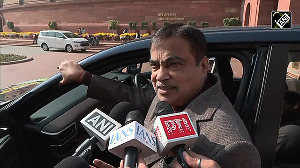At Rs 45,000, the champagne flute is more expensive than any bubbly you're likely to sip.
At just under six feet this is one stemglass you're unlikely to use anyway. Elsewhere, there's a sharkskin table lamp in approximately the same price range. "It's new and happening," designer Raseel Gujral explains, "at the same level as enamel."
Mohair rugs have a trim of pheasant feathers (also big in international fashion at the moment). Metallic colours have grown beyond silver to include gold and copper. And though the detailing is quiet, colours bloom at Gujral's signature store, Paradox One, in Delhi.
"Raseel," says Navin Ansal her husband and partner in the interiors and retail business, "is her own brand identity."
It's very likely true. For a little over 10 years now, the firm, Casa Paradox, has been hit on by every designer in town. Some have ripped off her designs, others have simply cribbed, but Gujral has walked off with the prices and the contracts.
The Gujral identity is opulent, design-centric, but not lush and overblown. International trends have been reflected in her interior assignments (70 per cent of her total business, the remaining 30 per cent being retail).
And now, Gujral has gone one step ahead, introducing a range of home accessories that she's importing directly from overseas, most of them one-offs or in minuscule quantities, so that chances of running into a vase similar to your own are negligible.
"I love shopping," she says, "and meet suppliers in Milan and Paris, at trade fairs." That results in containers shipped back with the kind of stuff she likes, -- mostly glass, ceramic and lacquer for now -- one range for the store (where accessories form 20 per cent of the total volume of products sold), and others that are intended only for her clients whose homes she is designing.
"My likes and dislikes are paramount," she explains. The Gujral label is fiercely aggressive. While Gujral handles the design and interiors projects, Ansal is the back-end operation of the company, looking to the fabrication.
"We have a huge repertoire of designs," he says, "but we won't do a design more than 10 times, at most."
At a time when imported furniture is putting both price and quality pressure on local designers, Gujral is not threatened.
"I'm usually asked if I'm importing my furniture," she says, "I don't know whether to take that as a compliment or not."
A team of dedicated contractors work with Ansal to complete the orders for the shop and for her interior clients. The finishes are completed in-house, though.
"We have a finishing factory," Ansal explains, "and are very finicky about the quality of our post-production output."
A franchise deal in Mumbai came unstuck some while ago, but plans are underfoot to open an owned store in the city. "I can see the retail end increasing from 30 per cent to 50 per cent," he explains.
Why has she succumbed to importing home accessories? "Because we're still stuck with Michael Aram trays and Alessi kettles," she says, "there's nothing new happening in the segment. People have the same things in every house. I want to bring in something new, in small quantities, and keep changing them, so that what's in around the globe comes to India, and we have a chance to combine great interior designs and furniture with great accents."
Why not tie-up a contract for supplying accessories to stores all over India? "I'm not a trader, a supplier," says Gujral ingenuously, "I'm a designer, and I'd like to stay that way." Touche.




